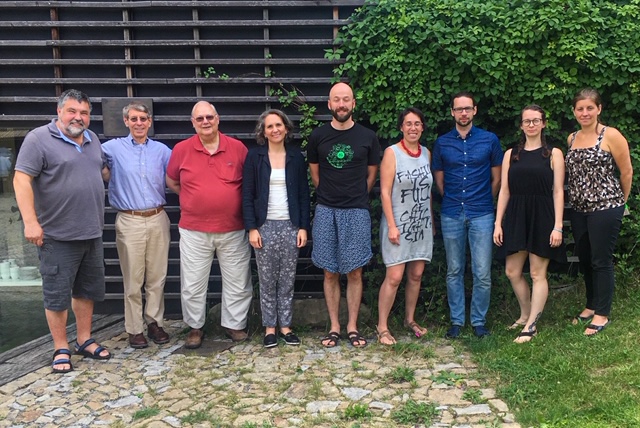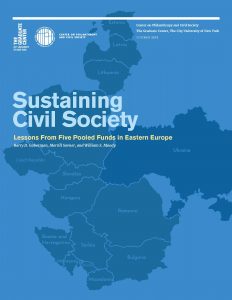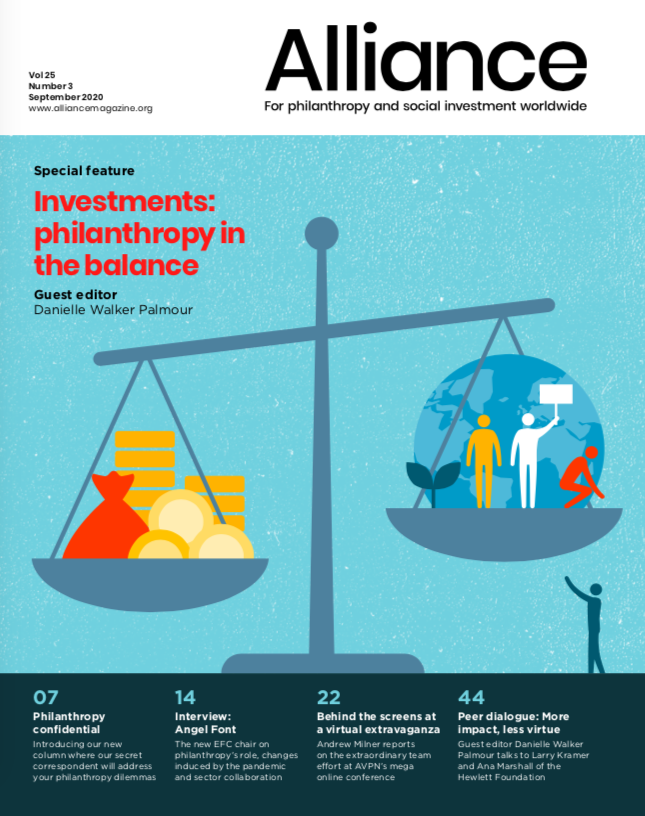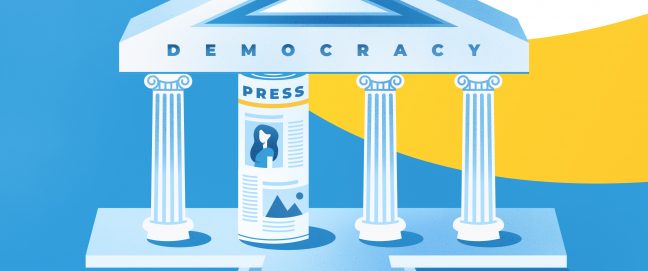Lessons from five pooled philanthropic funds hold clues for sustaining civil society in the years ahead
In 2017, we launched an initiative to examine the legacy and impact of a series of philanthropic investments established from 1991 to 2007 to sustain civil society in central and eastern Europe. Funded by US and European foundations and bilateral agencies, the five pooled funds were: the Environmental Partnership for Central Europe, the Baltic-American Partnership Fund, the Trust for Civil Society in Central and Eastern Europe, the Balkan Trust for Democracy, and the Black Sea Trust for Regional Cooperation. As former US foundation staff, who were present when important funding decisions were made, it felt like an appropriate time to reflect on these investments in light of the erosion of the optimistic rhetoric on civil society and widespread support for liberal democracy prevalent at that time.

Moody, Sovner and Gaberman with Czech Environmental Partnership Foundation staff in Brno, Czech Republic.
We embarked on a two-year project in 2018 to take a long view of these pooled funds. The effort involved desk research, travel across the region, and interviews with over 250 people involved in these funds and civil society. We also drew on our own past experience as primary sources. The resulting report[1] profiled the five pooled funds, compared them to other collaborative philanthropic efforts in the same context, summarised the legacy and impact reported in the interviews, and compiled lessons for philanthropy about what can be learned from past initiatives to build and support civil society.
We are struck that our findings are very relevant to a changed context in the wake of the Covid-19 pandemic. A few lessons stand out in particular.
We believe that foundations should convert all their grant relationships into general purpose grants. Such a constructive step would give the organisations the carte blanche to deal with complex problems as they see fit.
First, these pooled funds helped create a core set of organisations, policies, and practices undergirding healthy civil societies. Many of these organisations now serve as national grantmakers and strong advocates against the erosion of democratic procedures and norms. However, many of these same civil society organisations struggle with sustainability. Most of them cited ensuring financial resources as their biggest headache, even in the face of significant political pressure. Time and time again, we heard that flexible institutional support is not readily available.
Second, we found that a few specific types of civil society organisations merit special attention and increased resources. Advocacy and watchdog organisations are the harbingers of political pressures on the sector. Community philanthropy, with its bottom-up approach to developing local giving, has a wide view of community needs and plays an important role in building a culture of civil society support.
Philanthropic institutions have the ability to plan over the long term and assume risk beyond electoral cycles and financial bottom lines.
Third, we found that more work could have been done to embed civil society organisations over the long term. In particular, promoting civic education and participation, communicating the stories of civil society, and developing a culture of giving from local financial resources would have contributed to the sector’s longer term sustainability.
Following this pandemic, we hope philanthropy will learn from our research findings and experiences.
 This is a time for philanthropy to step up with much more flexible grants. We believe that foundations should convert all their grant relationships into general purpose grants. Such a constructive step would give the organisations the carte blanche to deal with complex problems as they see fit. This is not a time for organisations to be tied and shackled to projects. Furthermore, whenever possible, grant funds should be given up front as opposed to by installments.
This is a time for philanthropy to step up with much more flexible grants. We believe that foundations should convert all their grant relationships into general purpose grants. Such a constructive step would give the organisations the carte blanche to deal with complex problems as they see fit. This is not a time for organisations to be tied and shackled to projects. Furthermore, whenever possible, grant funds should be given up front as opposed to by installments.
In addition, funders must provide support to civil society organisations dealing with the coronavirus and to those guarding against the use of the pandemic to impinge on democratic practice – advocacy organisations are needed to resist rollbacks of democracy.
Most of all, we hope our work helps to rekindle a conversation about the importance of building and supporting civil society itself, a project that can take generations to develop. Philanthropic institutions have the ability to plan over the long term and assume risk beyond electoral cycles and financial bottom lines. Accordingly, we trust our colleagues in philanthropy will not lose sight of this long-term vision amidst a time of crisis.
Merrill Sovner is research fellow at the Center on Philanthropy and Civil Society, Graduate Center of the City University of New York.
Email: msovner@gradcenter.cuny.edu
Twitter: @cpcs_gccuny
William S. Moody, program director, Rockefeller Brothers Fund, retired.
Email: moodyws@msn.com
Barry Gaberman, senior vice president, Ford Foundation, retired.
Email: bgaberman@gmail.com





Comments (0)